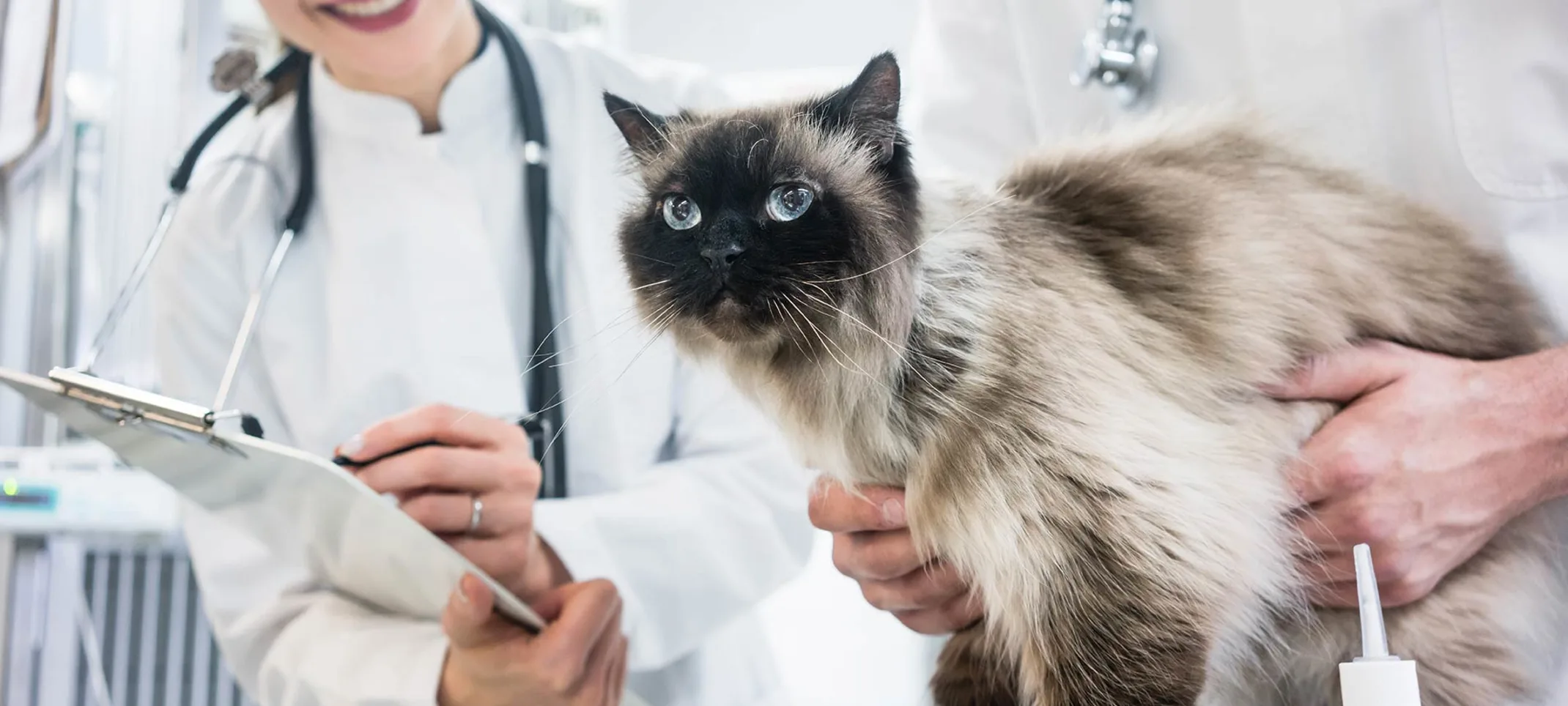Animal Medical & Surgical Center
Parasite Control (Fleas, Ticks & Heartworms)
Parasites such as fleas and ticks can be very damaging to your pet’s health. Preventive measures should be taken year-round to inhibit potential outbreaks.

Overview
The idea of your pet being infested with parasites is a disturbing thought, but it’s also a medical issue that can have serious consequences. Parasites can diminish quality of life and even cause life-threatening health issues.
Common internal parasites include heartworms, roundworms, hookworms, whipworms and tapeworms. The most frequent external parasites include fleas and ticks. Your pet should be free from parasites, both internal and external.
Why are parasites dangerous?
Fleas:
Fleas are small, wingless, brown, fast moving insects you can see in your pet’s fur. Some animals are allergic to the saliva of fleas, which can cause inflammation and more discomfort. If ingested while your pet is grooming themselves, fleas can transmit an intestinal parasite called tapeworm. Flea infestations can lead to anemia and fleas are also capable of transmitting serious diseases.
Ticks:
Ticks are members of the spider family and live in cracks and crevices in the home or outside in vegetation such as grassy meadows, woods, brush, and weeds. Some tick bites only cause mild irritation or swelling at the site, but other tick bites can infect your pet with serious illnesses. If left untreated, these diseases, such as lyme, can lead to more severe health problems or even be fatal.
Note: If you see a tick and cannot remove it, we will gladly help you. Call us immediately to limit the impact of the tick's attachment. It’s much safer to have one of our trained professionals remove the tick for you. Make an appointment with us immediately to limit the impact of the tick.
Heartworm Disease:
Heartworms are transmitted when an infected mosquito bites your pet. Heartworms are parasites that live in the heart and its surrounding blood vessels. The adult heartworm produces offspring called microfilariae, which circulate in the pet’s blood. Unrecognized and untreated heartworm infections can be fatal.
When should I seek treatment for parasites?
Fleas:
If your pet is showing signs of fleas such as continuous scratching, gnawing or licking, schedule an appointment immediately. Additionally, flea dirt, the byproduct of fleas that looks like coffee grounds or pepper, can usually be seen by looking at your pet’s abdomen or by combing your pet’s coat with a fine-tooth comb.
Ticks:
If you see a tick on your pet, do not try and burn it off with a match. This does not work and could harm your pet. It’s much safer to have one of our trained professionals remove the tick for you. Make an appointment with us immediately to limit the impact of the tick.
Heartworm Disease:
The best treatment for heartworms is prevention. One of the most common and effective prevention methods is a monthly oral medication.
The parasite is transmitted through mosquito bites and usually the pet shows no signs for months. Later symptoms include difficulty breathing, coughing, weight loss, tiring easily and listlessness. In many cases pets do not show outward signs until advanced stages of the disease. An annual blood test is recommended to screen for heartworms. This disease can be treated if found early, but it can be costly.
How can I prevent parasites?
Our veterinary team is happy to help you choose the correct preventive regimen based on your pet’s risk factors and health status. It is important to discuss with us yearly which pest control products are ideal for your household based on the everyday life of your pet.
Intestinal Parasites
Dogs and cats can become hosts to many intestinal parasites and a few general statements apply to all parasitic infections:
Diagnosis is usually made from a fresh stool sample or, in the case of tapeworms, seeing the segments in the stool. We use the most efficient detection method possible by centrifuging a sample to separate the parasite eggs so they can be seen on microscopic examination.
Up to 98 % of puppies and kittens are infected before birth and, for this reason, will need deworming starting at 2-3 weeks of age.
At this time there is no one dewormer that can eliminate all species of parasites. Consequently, an accurate diagnosis is necessary to treat your pet properly.
Occasionally, for a heavy parasitic infection, 3 or even 4 treatments may be necessary to eliminate the parasite.
The following is a brief description of the common intestinal parasites with their symptoms, diagnosis, treatment, prevention, and mode of human transmission.
ROUNDWORMS: Roundworms are a common parasite of puppies and kittens, but can be seen in any dog or cat. Diagnosis is made from a microscopic examination of the feces or from a description of the worm if it seen in the stool or vomitus. Symptoms will vary from none to vomiting, diarrhea, and abdominal swelling. Transmission to adult dogs and cats occurs by infected feces of other animals. For dogs, some heartworm preventatives also prevent roundworm infection. Transmission to humans is possible; young children seem to be more commonly affected. Roundworms are a human health concern.
HOOKWORMS: Hookworms are also a common parasite of puppies and kittens, but are seen with equal frequency in adult pets. This parasite sucks your pet’s blood robbing them of nutrition and can cause severe anemia. Diagnosis is made from microscopic examination of your pet’s stool. Symptoms will vary from none to blood in the stool (dark tar-colored stool) with diarrhea. Severe cases may need hospitalization and blood transfusion. Transmission to adults occurs by infected feces contaminating the grass and soil. Prevention, therefore, requires that the pet be kept away from contaminated soil areas. Some heartworm preventative can also prevent hookworm infections in dogs. Transmission to humans is possible and usually shows up as skin lesions. Hookworms are a human health concern.
WHIPWORMS: Whipworms affect dogs only. Diagnosis is also made from a microscopic exam of the feces. Eggs from this parasite pass intermittently, however, so it may be necessary to check multiple stool samples before a diagnosis is made. Symptoms vary from none to severe watery diarrhea, vomiting, and significant weight loss. Some dogs require hospitalization for treatment of dehydration, malnutrition, and infection. Whipworms can be difficult to eliminate because they can live for years in the soil after the initial infestation. There is no human transmission.
TAPEWORMS: Tapeworms are a common parasite that affects both cats and dogs. Transmission occurs when your eats an infected flea or sometimes by eating an infected rodent. The tapeworm attaches to the intestine and begins to grow “segments”. In about 3 weeks, these segments begin to pass in the stool. They are approximately ¼ to ½ inch long, flat, white, and resemble a grain of rice. After a short time in the air, they dry up to resemble a small, yellow flat seed. Diagnosis is made from seeing these segments in the stool or on the pet’s back end rather than a microscopic fecal exam. Treatment is either by oral tablets or by an injection. Prevention is strict flea control and preventing the ingestion of rodents. Although humans can get tapeworms, there is no direct transmission from a dog or cat to a human.
GIARDIA: Giardia is not a worm but a very tiny single-celled parasite that can live in the intestines of dogs, cats, and man. It is seen most commonly in dogs coming out of a kennel type situation (pet stores, shelters, dog pounds, etc.) but its incidence is increasing. Symptoms include intermittent or continuous diarrhea, weight loss, depression, and loss of appetite. Diagnosis is made from a fresh stool specimen for optimum results. A surprising number of affected animals are “occult”; that is, they are infected but are negative on these tests even with multiple examinations. As a result, this parasite is often treated without confirming diagnosis. Treatment is an oral medication. Prevention involves careful disposal of all fecal material and cleaning contaminated areas. Humans can become infected with Giardia, so special care must be taken to be diligent with washing hands, bowls and utensils.
COCCIDIA: Coccidia is also a single-celled parasite. It is seen primarily in puppies and kittens, although debilitated adults can also be affected. Transmission occurs by eating the infective stage of the parasite. It then reproduces in the intestinal tract causing no symptoms in mild cases to bloody diarrhea in severely affected pets. Diagnosis is made from a fresh stool sample. Treatment varies greatly. Animals showing no signs of illness are often not treated because a mild case is often self-limiting. Pets with diarrhea are treated with an oral medication. Severely affected pets may need hospitalization. Prevention involves disposal of all stools and cleaning the pet’s living area. Human transmission is uncommon, but can occur.

